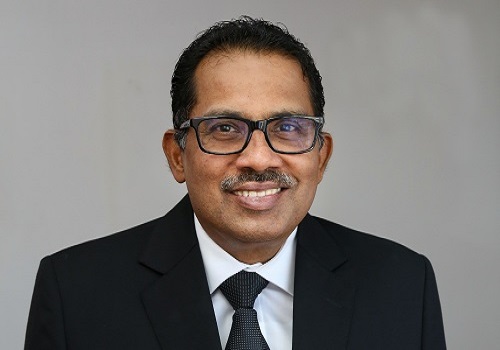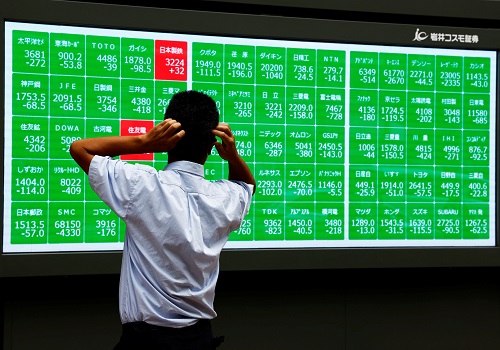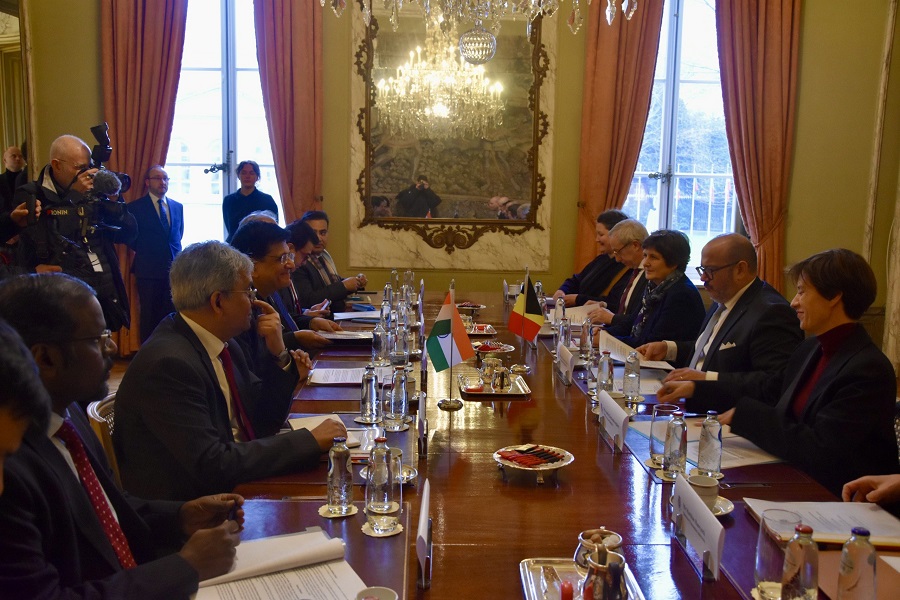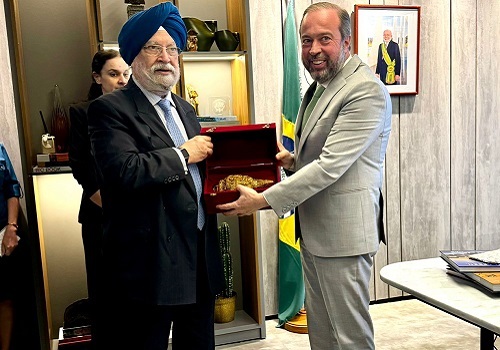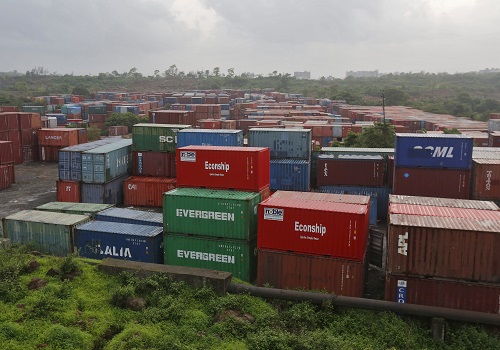O.P. Jindal Global University VC C. Raj Kumar addresses Japanese parliament
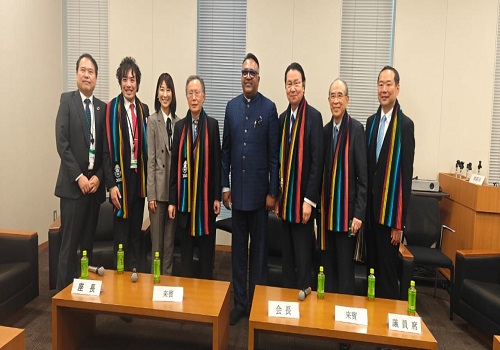
At the invitation of the Japanese Parliamentary Committee of the World Federation, the founding Vice Chancellor of O. P. Jindal Global University (JGU), Professor (Dr) C. Raj Kumar addressed a caucus of over 20 distinguished Members of the Japanese Parliament (National Diet), which also included Minister of Education, Culture, Sports, Science and Technology, Government of Japan, Masahito Moriyama.
It is truly remarkable that Prof Raj Kumar is also the first Indian Vice Chancellor to be invited to speak at the Japanese Parliament to address the distinguished MPs and public officials of the Government of Japan.
The Japanese Parliamentary Committee of the World Federation invited Prof Kumar to share his views on issues relating to India’s national education policy, bilateral relations, development agenda and global governance. The committee comprised of the some of the most distinguished members of the house of representatives of the Japanese Parliament and other public officials: Mitsuo Ohashi, Chairman, Japanese Parliamentary Committee of the World Federation, Professor Masakuni Tanimoto, Under Secretary General, Japanese Parliamentary Committee of the World Federation, Kiyoshi Odawara, State Minister of Foreign Affairs, Japan, H.E. Makoto Hayashi, Deputy Assistant Minister, Ministry of Foreign Affairs, Takahiro Kanamori, Representative, Friends of the United Nations, Asia-Pacific, Hirobumi Niki, Member of the House of Representatives, Liberal Democratic Party, Masahito Moriyama, Minister of Education, Culture, Sports, Science and Technology of Japan, Seishiro Eto, Member of the House of Representatives, Former Vice Speaker, House of Representatives, Motoko Mizuno, Member, House of Councillors, The Constitutional Democratic Party of Japan, Satoshi Asano, Member of the House of Representatives, Democratic Party for the People, Mr. Kenta Aoshima, Member of the House of Councillors, Ayaka Shiomura, Member of the House of Councillors and Makoto Hayashi, Deputy Assistant Minister & Ambassador, ASEAN, Asian and Oceanian Bureau and Southeast and Southwest Asian Affairs Department and Sukehiro Hasegawa,Chairman, Japan Advisory Committee on Global Governance & Former Special Representative of the Secretary-General of the United Nations for Timor-Leste.
Kumar, delivered a speech on the Indo-Japan relationship, framing it as a cornerstone for collective progress and prosperity. “The India-Japan relationship is undoubtedly the most important and critical relationship in the Indo-Pacific region.” Kumar articulated five key points, encapsulating the historical, cultural, economic, political and strategic dimensions of the bilateral ties between India and Japan.We have deep-rooted ties between India and Japan, stemming from shared civilisational values and cultural heritage, including the profound influence of Buddhism as a religion and philosophy in both the countries.”
He recalled the outstanding courage of conviction and intellectual integrity of the distinguished Indian jurist, Justice Radha Binod Pal, former Judge of the International Military Tribunal for the Far East for his contribution to equity, justice and fairness in Tokyo Trials by ensuring that international criminal justice does not perpetuate the “Victor’s Justice” phenomenon. He was one of three Asian judges appointed to the International Military Tribunal for the Far East, the "Tokyo Trials" of Japanese war crimes committed during the Second World War. Among all the judges of the tribunal, he was the only one who submitted a judgment which insisted all defendants were not guilty,” he said. Kumar emphasised the enduring people-to-people connections that serve as a foundation for the collaboration between both the countries in various sectors, which also requires greater expansion and deeper engagement.
The Vice Chancellor highlighted India's historical support for Japan's political development post-World War II, recognising Japan’s sovereignty and integrity emphasising India's role in nurturing Japan's resurgence and progress. India’s early support to Japan for recognising its sovereignty was unequivocal and came at a time when most counties of the world were reluctant to do so in the early 1950s. Drawing parallels with the evolution of Indo-Japanese relations, Kumar cited examples such as Maruti Suzuki's transformative impact on the automobile sector, showcasing the potential for innovation and economic collaboration. He further stressed that this landmark collaboration democratised access to transportation, especially for the middle-class population in India and paved way for reforms and expansion in India’s automobile sector.
Kumar emphasised the alignment of democratic principles, rule of law, and respect for human rights, emphasising the convergence of enlightened national interests and democratic values between the two nations. He underscored India's demographic dividend manifested through a billion people who are less than 35 years of age, with a burgeoning youth population poised to collaborate with their Japanese counterparts for mutual growth and development.
Highlighting the Indo-Pacific Strategic Construct, Kumar stressed Japan's pivotal role in ensuring peace, stability, and sustainability in the region. He emphasised the need for long-term cooperation between India and Japan to address the shared challenges relating to peace, development and security in the Indo-Pacific region. His speech generated a lively interest and discussion among the Japanese MPs. In response to questions and perspectives shared by the MPs, Kumar expounded on India and Japan's joint endeavours within the United Nations, advocating for their permanent representation in the Security Council and the reform of the UN. Further, he reiterated India's steadfast commitment to higher education, emphasising the principles of excellence, equity, and inclusion as outlined in India’s National Education Policy 2020. Kumar also highlighted that these principles find manifestation through our commitment to excellence, diversity and access by offering scholarships and institutional support to our students. Kumar observed that universities such as JGU and other reputed higher education institutions in India foster an environment conducive to promoting research excellence and innovation among our faculty for institution building.
In conclusion, Kumar reiterated the transformative potential of Indo-Japanese relations that needs to be built on the expansion of educational partnerships between universities in both countries. He expressed optimism about the future trajectory of Indo-Japanese collaboration in higher education, envisioning a landscape defined by excellence in research and scholarship, and the creation of knowledge through leadership in promoting frugal innovation.
Kumar led a high-level faculty delegation from O.P. Jindal Global University to Japan which included Professor (Dr) Mohan Kumar, Dean, Strategic and International Initiatives, Professor of Diplomatic Practice & Director, Jindal Global Centre for G20 Studies, Professor Kathleen A. Modrowski, Dean, Jindal School of Liberal Arts and Humanities, Professor Padmanabha Ramanujam, Professor of Law & Dean of Academic Governance and Student Life, Professor (Dr) Upasana Mahanta, Professor of Political Science & Dean, Office of Admissions and Outreach, Professor (Dr) Vesselin Popovski, Professor of Law & Vice Dean, Jindal Global Law School and Executive Director, Centre for the Study of United Nations, JGU and Professor (Dr) Akhil Bhardwaj, Associate Professor & Associate Dean and Director, Office of International Affairs & Global Initiatives.




